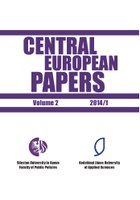Diplomatic Missions of the Holy See in Hungary and East-Central Europe after the Second World War
Diplomatic Missions of the Holy See in Hungary and East-Central Europe after the Second World War
Author(s): Margit BaloghSubject(s): History
Published by: Slezská univerzita v Opavě, Fakulta veřejných politik
Keywords: Holy See; Catholic Church; Soviet Union; Russian Orthodox Church; Concordat; diplomatic relations; Nunciature; Apostolic Nuncio; Hungary; Czechoslovakia; Yugoslavia; Poland; Romania; Albania; Bulgaria; Prince Primate József Mindszenty; Hungarian Catholic
Summary/Abstract: Diplomatic relations are established by the Holy See and not by the Vatican, therefore it is accurate to speak about the diplomatic relations of the Holy See and not that of the Vatican. This analysis would like to outline how the representatives of the Holy See, assigned to the East-Central European countries, could work in the new political situation after World War II. It tries to set it in the context of the new social, political and geographical field, which this region entered as an area occupied by the Red Army. In the interwar period the Holy See concluded concordats with some countries of the East-Central European region (with Poland, Romania, the German Reich, Austria and the Kingdom of the Serbs, Croats and Slovenes; it signed a ‘modus vivendi’ with Czechoslovakia and concluded the Lateran Treaty with Italy). In the case of Hungary, a so-called ‘intesa semplice’ entered into force in 1927 that was not a bilateral, international treaty, this is why it is called “simple agreement”. Yet in general it is true that between 1944/45 and 1947/48 it was in the interests of nearly every East-Central European government to show religious tolerance to some extent and maintain connections with the Holy See. Marxism was not an insurmountable obstacle for the Holy See, since it had diplomatic relations with Muslim countries as well. Rome distinguishes between governments and ideologies; namely, it represents an intransigent position as regards ethical or religious principles, at the same time it does not refuse to enter into negotiations with any political figure or group. However, in the long run the Papal Nunciatures were not allowed to remain in the countries of the Soviet sphere of influence, whether or not the given country was on the winning or losing side of the war.
Journal: Central European Papers
- Issue Year: 2/2014
- Issue No: 1
- Page Range: 88-114
- Page Count: 27
- Language: English

